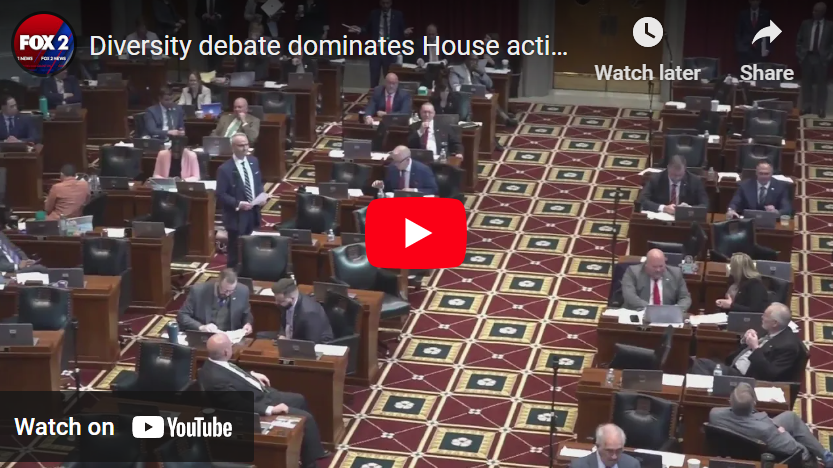
Advocacy Alert | Urgent Sign-on Letter Regarding Diversity, Equity, and Inclusion
Missouri State Budget: Diversity, Equity, and Inclusion
The Missouri House of Representatives passed a $45 billion state budget at the end of March that blocks funding for diversity, equity, and inclusion initiatives and efforts across the state. The harmful impact of anti-diversity, equity, and inclusion language in state law is far and wide.
To that end, Deaconess Partner Missouri Budget Project has drafted a letter addressed to the Missouri Senate Appropriations Committee raising appropriate concerns and highlighting the consequential effects of the House’s action. It is critical that the language be removed from the state’s budget and that lawmakers hear from civic and business leaders across the state that efforts to dampen diversity, equity, and inclusion should not be codified in state law.
The full text of the letter is below. We hope you consider joining us in signing on.
Please use this link to add your organization’s name to the letter by the extended deadline of Friday, April 21, 2023.
April 2023
To Members of the Senate Appropriations Committee:
We are writing to share concerns about language the House of Representatives added to the Fiscal Year 2024 budget bills. Specifically, the language of concern would prohibit funding from being used for staffing, programs and vendors associated with diversity, equity and inclusion. We believe this language will result in wide-ranging consequences and would undermine lawmakers’ economic and workforce priorities.
The broad language added to the bills raises questions about its practical application and how it would impact an array of services and programs that the state provides – including those critical to lawmakers’ economic and workforce priorities.
The language reads:
No funds shall be expended for staffing, vendors, consultants, or programs associated with “Diversity, Equity, Inclusion,” or “Diversity, Inclusion, Belonging,” or any other initiative which similarly promotes: 1) the preferential treatment of any individual or group of individuals based upon race, color, religion, sex, gender, sexuality, ethnicity, national origin, or ancestry; 2) the concept that disparities are necessarily tied to oppression; 3) collective guilt ideologies; 4) intersectional or divisive identity activism; or, 5) the limiting of freedom of conscience, thought, or speech. This does not prohibit the department from following federal and state employment and anti-discrimination laws.
However, multiple programs and services offered in Missouri are either required by their accrediting bodies to incorporate the concepts of diversity, equity, and inclusion into their programs, or are specifically designed to ameliorate longstanding disparities in health and economic outcomes. The budget language would jeopardize licensing and accreditation of programs critical to both the wellbeing of Missourians and our state’s economic competitiveness. For instance:
Many nonprofit child welfare organizations, health and mental health service providers, and others with whom Missouri contracts to provide services are required through their national accrediting organizations to provide programming that incorporates diversity, equity and inclusion. In addition to risks to accreditation, failure to meet those standards could result in the loss of federal funding as well as private funding from foundations.
Similarly, the national bodies accrediting professional education programs like those for teachers, social workers, psychiatrists, nurses and other health professionals are also required to incorporate training in diversity, equity and inclusion. Not only would the added budget language jeopardize the accreditation of these programs at Missouri’s public colleges and universities, but the licensure of new professionals could be at risk.
Moreover, we recognize that Missourians continue to face deep disparities in their health and economic outcomes based on race. While white workers in Missouri earn an average of $65,820 per year, Hispanic workers earn $53,178 and Black workers earn just $41,132 annually. While 33% of white Missourians have a college degree, only 21% of Black Missourians and 23% of Hispanic Missourians complete college. Missouri has one of the highest rates in the nation of premature death among Black residents, and Black moms in Missouri face a maternal mortality rate that is three times that of white moms. As long as these disparities exist in Missouri, we should not dampen efforts that would seek to understand and address them. Unfortunately, the added budget language would likely conflict with several existing efforts, threatening:
Targeted workforce and economic development programs,
State contracts with vendors to provide services, including minority-owned businesses and other private companies,
Department of Health programs targeted based on demographic factors, and
Missouri Department of Public Safety’s continuing education for law enforcement that includes education in racial profiling and implicit bias.
There are likely additional consequences related to state contracts with private
companies, hiring and employment standards that are not mentioned here, but which could also have far-reaching implications.
The clear accreditation issues and vast uncertainty created by the added budget language would severely hamper Missouri’s workforce development and economic competitiveness, and we encourage you to remove the concerning language from all budget bills.
Use this link to sign on to the letter by the end of the day on Friday, April 21, 2023.
WATCH: Diversity debate dominates House action on Missouri state budget
